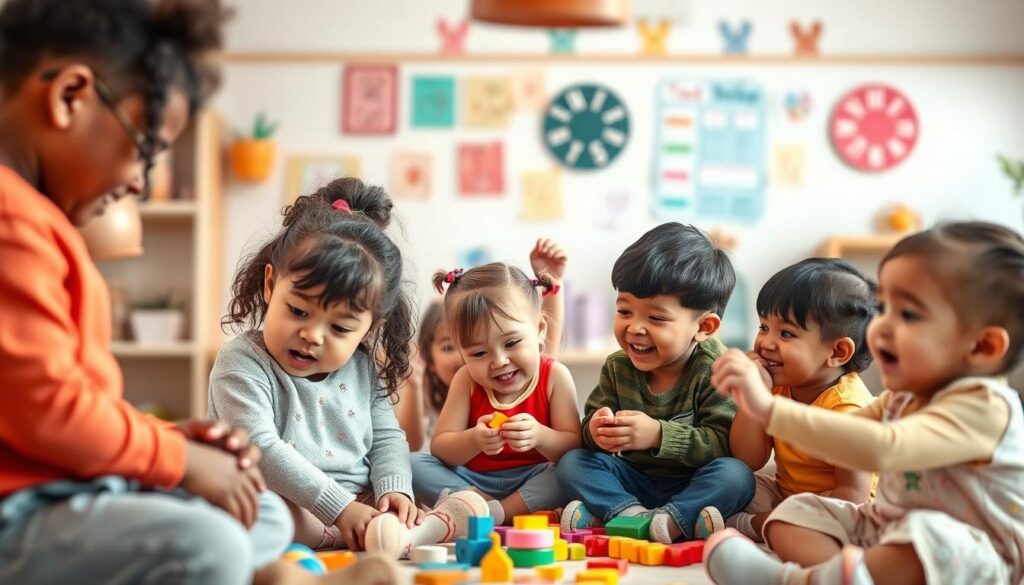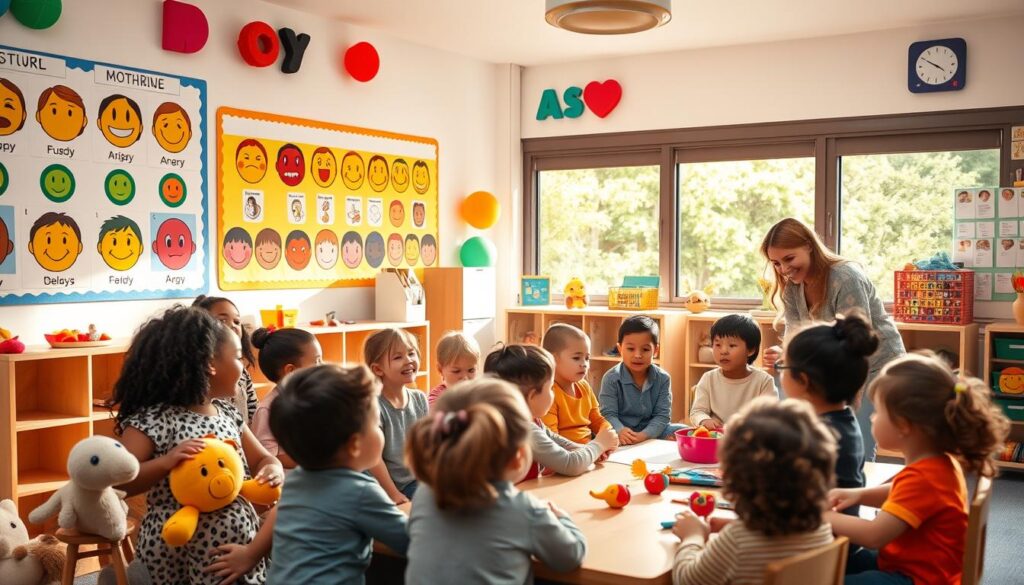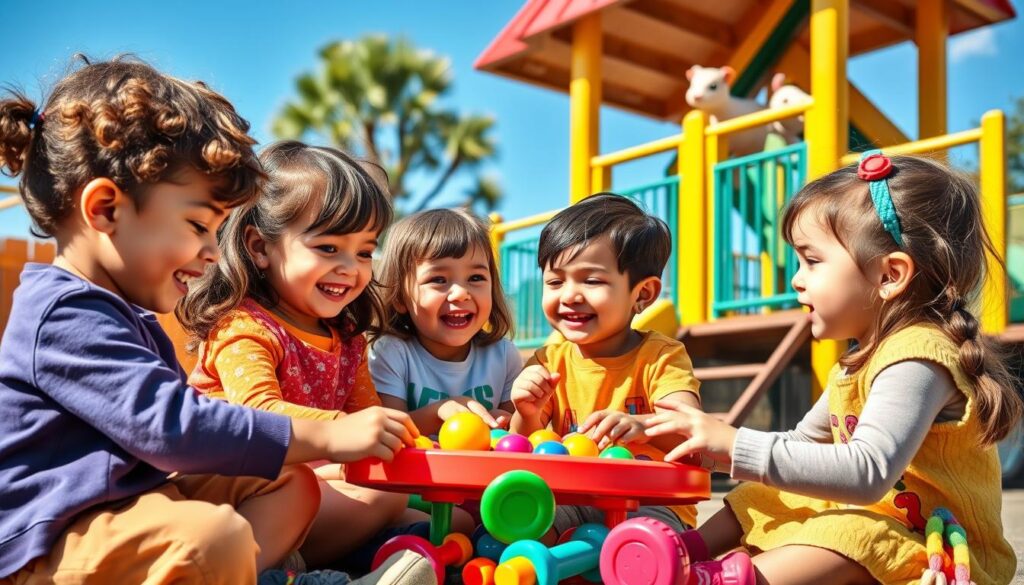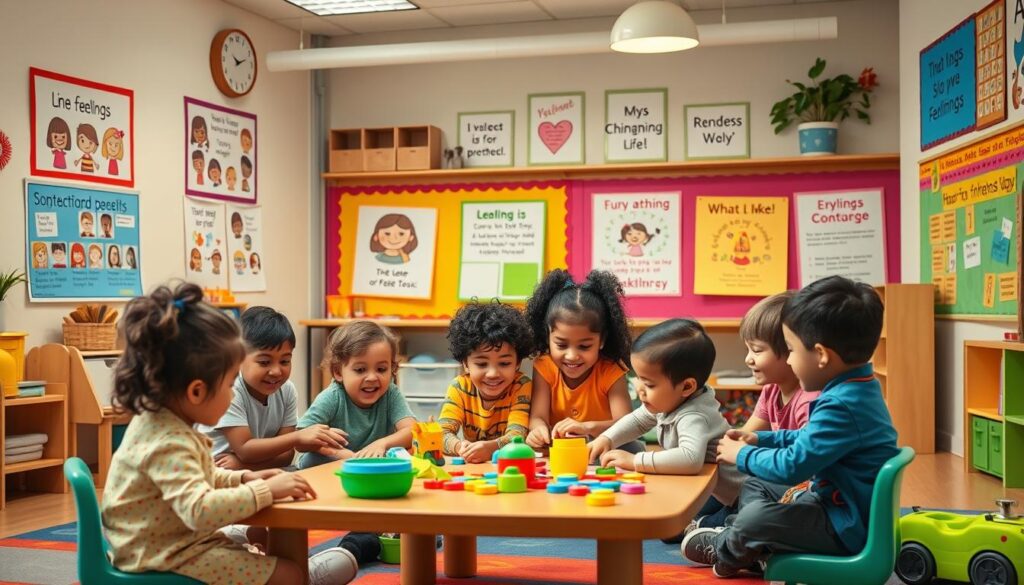As a parent, you have a big role in helping your preschooler grow emotionally. You might wonder what emotional intelligence is and how it affects your child. Can teaching your preschooler about emotional intelligence really help them in school and with friends?
Emotional intelligence is key for a child’s growth. Understanding it and how to help preschoolers develop it is the first step. This way, you can support your child’s emotional journey and help them grow emotionally.
Key Takeaways
- Emotional intelligence is essential for a child’s social, emotional, and academic development
- Preschooler emotional development is a critical stage in developing emotional intelligence
- Helping your preschooler develop emotional intelligence can positively impact their life
- As a parent, you play a significant role in nurturing your child’s emotional journey
- Understanding emotional intelligence and its development in preschoolers is vital for supporting your child’s growth
- Helping your preschooler develop emotional intelligence can be achieved through practical tips and strategies
Understanding Emotional Intelligence in Preschoolers
As a parent, you have a big role in helping kids develop emotional intelligence. It’s key for their social, emotional, and academic growth. Knowing how emotional intelligence grows in young ones helps you support their development.
Emotional intelligence includes self-awareness, self-regulation, motivation, empathy, and social skills. These are vital for kids to form good relationships, do well in school, and be happy. By focusing on emotional intelligence, you give them a strong base for future success.
The Five Components of Emotional Intelligence
- Self-awareness: recognizing and understanding their emotions
- Self-regulation: managing their emotions and behaviors
- Motivation: using emotions to drive motivation and achievement
- Empathy: understanding and appreciating the feelings of others
- Social skills: developing healthy relationships and communicating effectively
By promoting emotional awareness in preschoolers, you help them grow these important skills. This lets them handle social situations, build strong bonds, and do well in school.
Why Early Development Matters
Early childhood is a key time for emotional growth. What happens then shapes their brain and future emotional intelligence. By focusing on emotional intelligence early, you help them develop the skills for success.
Signs of Emotional Intelligence in Young Children
As a parent, you are key in helping your child grow emotionally. It’s important to know the signs of emotional intelligence. This helps your child become a well-rounded person. Look for how your child shows and understands feelings, cares for others, and gets along with people.
Some key signs of emotional intelligence in young children include:
- Ability to identify and label emotions
- Empathy towards others, such as sharing or comforting a friend
- Developing social skills, like cooperation and communication
By supporting emotional growth in young children and enhancing emotional intelligence in toddlers, you can lay a strong foundation for their future. You can do this by teaching them to name their feelings, encouraging them to care for others, and showing them how to manage their emotions.

Every child is different, so it’s vital to tailor your approach to fit your child’s needs and personality. This way, you can help your child grow into a confident, caring, and emotionally smart person.
Creating an Emotionally Supportive Environment at Home
As a parent, you have a big role in helping your child grow emotionally. One key way is by making your home a safe space for feelings. This lets your child learn important skills like teaching empathy to preschoolers and promoting social-emotional skills in young kids.
To make this space, try these ideas:
- Make a quiet spot for your child to share their feelings without being interrupted
- Listen well when your child talks about their feelings and worries
- Show your own feelings and emotions to teach your child about emotional health
Having daily talks about feelings can keep you close to your child’s emotional world. Just ask them about their day and how they felt. This helps your child understand and manage their emotions better. It’s key for teaching empathy to preschoolers and promoting social-emotional skills in young kids.

By using these tips, you can make your home a supportive place for your child’s emotional growth. Remember, promoting social-emotional skills in young kids takes time, patience, and support.
Teaching Your Preschooler to Recognize Emotions
It’s important to help your preschooler grow emotionally. Teaching them to recognize emotions is a great way to do this. You can use feeling charts or emotion cards to help them identify feelings. This helps them grow emotionally and prepares them for more complex skills later.
Reading stories that show different emotions is another good way. It helps your child understand and connect with various feelings. This way, you’re teaching them to recognize and manage their emotions. Some key strategies include:
- Using visual aids like feeling charts or emotion cards
- Reading stories that explore different emotions
- Encouraging your child to express and label their emotions
By using these strategies, you support your child’s emotional growth. Remember, teaching emotions takes patience and consistency. With time, your child will get better at recognizing and managing their feelings. This will help them succeed socially and emotionally in the long run.

As you help your child grow emotionally, remember they learn at their own pace. Always praise and encourage them as they learn. This creates a supportive environment for their growth and exploration. By doing this, you’re helping your preschooler develop emotional intelligence for a lifetime of well-being and success.
Helping Your Preschooler Develop Emotional Intelligence Through Play
Play is a great way to help preschoolers grow emotionally. It helps them learn empathy, self-awareness, and how to get along with others. Playing together can be both fun and educational, preparing them for the future.
Here are some ways to boost emotional intelligence through play:
- Role-playing activities that encourage empathy and social skills
- Emotion-based games that teach children to recognize and manage emotions
- Creative arts and expression that provide an outlet for children to explore and express their emotions in a healthy way
By adding these activities to playtime, you lay a strong emotional intelligence foundation. Emotional awareness in preschoolers is key for their growth. As you play, show your child how to handle emotions healthily.

Make play a key part of your child’s day. This way, they’ll grow emotionally strong. With patience and play, your child will learn to understand and manage their feelings well.
Building Empathy and Social Awareness
Supporting your child’s emotional growth is key. Focus on building empathy and social awareness. This helps enhance emotional intelligence in toddlers. It also leads to better relationships with others.
Ways to boost empathy and social awareness in preschoolers include:
- Role-playing activities that encourage sharing and taking turns
- Discussing feelings and emotions to help your child understand different perspectives
- Engaging in community service or volunteer work to teach your child about social responsibility
By supporting emotional growth in young children, you’ll help them develop important social skills. These skills include cooperation, communication, and conflict resolution. This prepares them for success in life.

Building empathy and social awareness takes time, patience, and positive reinforcement. By working together with your child, you create a nurturing environment. This helps them develop the emotional intelligence and social skills needed to succeed in today’s world.
Managing Strong Emotions and Developing Self-regulation
As a parent, it’s key to help your preschooler handle strong feelings and learn self-control. This can be done by teaching empathy to preschoolers and promoting social-emotional skills in young kids. These skills help your child build good relationships and solve problems well.
Teaching calming methods, like deep breathing or counting, is a good start. You can also teach coping strategies, like talking about feelings or playing sports. Here are some ways to help your preschooler learn self-control:
- Encourage your child to share their feelings through art or music
- Show them how to manage emotions by being a good example
- Teach your child to take breaks and do relaxing things, like reading or listening to calm music
By using these tips and promoting social-emotional skills in young kids, you’ll help your preschooler manage their emotions better. Remember, teaching empathy to preschoolers is a journey that needs patience, understanding, and support.

As your child grows, they’ll face many challenges that need strong emotional control. By starting early and promoting social-emotional skills in young kids, you’ll equip them for success in life.
| Age | Emotional Regulation Skills |
|---|---|
| 3-4 years | Identifying and expressing emotions |
| 5-6 years | Developing coping strategies and self-regulation skills |
Incorporating Emotional Learning into Daily Routines
Helping your preschooler grow emotionally is a journey that fits into everyday life. It’s about making emotional learning a part of their daily routine. You can do this by talking about feelings during meals or before bed.
Start emotional learning by making it a conversation starter. Ask your child to share their feelings during meals or before bed. This helps them understand and express their emotions. Also, tie emotional learning to daily tasks like caring for a pet or helping with chores.
Here are some ways to add emotional learning to your child’s daily life:
- Daily emotional check-ins to discuss feelings and concerns
- Role-playing activities to practice social skills and empathy
- Creating a feelings chart to help your child identify and express their emotions

By weaving emotional learning into daily routines, you support your child’s emotional growth. Be consistent and creative. Make it fun and engaging for your child.
Addressing Emotional Challenges in Social Settings
Helping your child deal with social interactions is key. Emotional intelligence in children is vital for good relationships and handling conflicts. Teaching them to express their feelings helps them connect with others and do well in social situations.
There are important strategies for tackling emotional issues in social settings. These include:
- Navigating playground conflicts in a constructive manner
- Building friendship skills through empathy and active listening
- Working with teachers and caregivers to create a supportive environment
Using these strategies helps your child grow emotionally. Emotional awareness in preschoolers is key. It lets them understand and see others’ feelings. This way, they build a strong base for future social and emotional success.
Remember, every child is different. What works for one might not work for another. Be patient, supportive, and understanding. This helps your child develop the emotional smarts they need to succeed socially.
| Strategy | Benefits |
|---|---|
| Navigating playground conflicts | Develops problem-solving skills and empathy |
| Building friendship skills | Enhances social connections and emotional awareness |
| Working with teachers and caregivers | Creates a supportive environment and promotes emotional intelligence |
Measuring Progress and Celebrating Growth
Supporting emotional growth in young children is key. It’s important to measure and celebrate their progress. This motivates them and helps them keep growing emotionally.
Ways to measure progress include:
- Watching changes in how they act and feel
- Seeing how they do in social situations
- Noticing how they handle their own feelings and actions
When celebrating their growth, remember:
- Give specific praise for what they’ve done well
- Use words that make them feel good about themselves
- Make a place where they can always grow and learn
Helping young children grow emotionally is very important. Stay patient, keep it up, and celebrate each child’s unique path.
Celebrating small victories can have a profound impact on a child’s emotional development, as it acknowledges their efforts and reinforces positive behaviors.
By doing this every day, you can really change the lives of the children you help.
Conclusion: Nurturing Your Child’s Emotional Journey
Guiding your preschooler through emotional growth is a lifelong journey. It needs patience, love, and dedication. By using the strategies from this article, you can help your child grow emotionally. These skills are key for a happy and successful life.
Always celebrate your child’s progress, no matter how small. Show them you believe in them and their feelings. Create a space where they feel safe to express and manage their emotions. With your support, your child will grow into a strong, caring, and emotionally smart person.
Being a parent is a great honor, and helping your child emotionally is a big part of it. Take this chance to watch your preschooler become a resilient, empathetic, and emotionally intelligent person.
